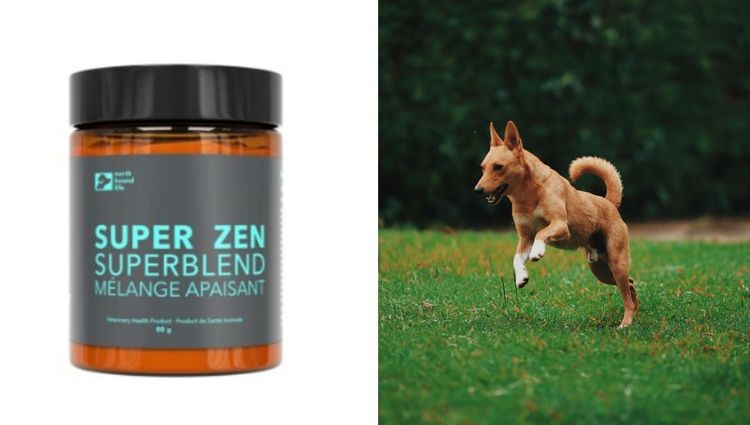Treating Acute or Bloody Dog Diarrhea: Natural Home Remedies for Quick Recovery

Dog diarrhea can be a distressing experience for both pet owners and their furry companions. While there are various causes of diarrhea in dogs, including dietary indiscretion, stress, infections, and underlying health conditions, it is essential to provide immediate relief and support your dog's digestive system during this uncomfortable time.
In this comprehensive guide, we will explore natural home remedies that can help alleviate acute or bloody dog diarrhea. However, please remember that these remedies should supplement professional veterinary advice, and it is crucial to consult with a veterinarian before starting any new treatments.
When it comes to your dog's digestive tract or digestive upset check that your dog's regular food isn't causing the problem. It may also be food allergies
Understanding Causes and Symptoms of Dog Diarrhea
Dog diarrhea can present itself in different ways, ranging from mild to severe. Common symptoms include frequent loose or watery stools, increased urgency to defecate, loss of appetite, vomiting, abdominal pain, and dehydration.
It is important to note that severe bloody diarrhea or signs of illness like weakness, fever, or weight loss require immediate veterinary attention.
Possible Causes of Dog Diarrhea Include
- Dietary Indiscretion: Eating spoiled food, garbage, or sudden changes in diet.
- Stress or Anxiety: Emotional distress or significant life changes.
- Infections: Viruses, bacteria, or parasites such as parvovirus or whipworms.
- Inflammatory Bowel Disease: Chronic inflammation of the gastrointestinal tract.
- Exocrine Pancreatic Insufficiency: Impaired digestion due to insufficient pancreatic enzyme production.
- Allergies: Reactions to certain foods or environmental factors.
- Other Health Conditions: Hormonal imbalances, cancer, kidney or liver disease.
Natural Remedy for Dog Diarrhea
Herbal Remedies
- Chamomile: Known for its anti-inflammatory properties, chamomile can soothe the digestive system. Brew a weak chamomile tea, let it cool, and offer small amounts to your dog.
- Slippery Elm: It can help relieve irritation and inflammation in the gastrointestinal tract. Mix a small amount of slippery elm powder with water or food and administer as directed by your veterinarian.
- Peppermint: Known for its calming effects on the stomach, peppermint can help reduce diarrhea. Consult your vet for appropriate dosage and methods of administration.
Dietary Adjustments
- Fasting: Giving your dog's digestive system a break can help alleviate acute diarrhea. Withhold food for 12-24 hours, ensuring access to fresh water. If symptoms persist or worsen, seek veterinary advice.
- Bland Diet: After fasting, gradually reintroduce a bland diet consisting of boiled chicken or lean ground turkey with cooked rice or sweet potato. This easily digestible combination can help firm up stools.
- Probiotics: Adding probiotics to your dog's diet can promote the growth of beneficial gut bacteria and aid in recovery. Consult with your vet to choose the right probiotic supplement for your dog.
Natural Supplements
- Psyllium Husk: This soluble fiber can help regulate bowel movements and absorb excess water. Follow your veterinarian's instructions for proper dosage and administration.
- Activated Charcoal: In cases of toxin or bacterial ingestion, charcoal can help absorb harmful substances. However, always consult your vet before administering activated charcoal to your dog.
Remember to closely monitor your dog's condition and adjust remedies as needed. If symptoms persist or worsen, seek immediate veterinary attention.

Preventing Dog Diarrhea
While it may not be possible to prevent all episodes of dog diarrhea, you can take some measures to minimize the risk:
- Maintain a consistent diet and avoid sudden dietary changes.
- Keep garbage and hazardous substances out of your dog's reach.
- Provide plenty of fresh, clean water at all times.
- Minimize stress and provide a calm environment for your dog.
- Regularly deworm your dog and keep vaccinations up to date.
- Follow recommended hygiene practices, such as proper handwashing after handling feces.
Bland Dog Diet
A bland diet for dogs is specifically designed to aid in digestive recovery and alleviate stomach upsets. It is characterized by its simplicity and digestibility. Typically, a bland diet includes foods like boiled chicken, lean ground turkey, pumpkin and sweet potatoes. These foods are not only easy on a dog's stomach but also provide essential nutrients needed for recovery.
The boiled chicken or turkey provides the necessary protein, while the pumpkin or sweet potatoes offer a good source of carbohydrates that are easy to digest. The cooking process also makes these foods more palatable and easier for dogs to consume. We don't recommend white rice due to the high toxicity levels that can be found in it.
Remember to serve these foods in appropriately small portions to prevent overeating, which could further exacerbate stomach issues. Always consult with your veterinarian before making any drastic changes to your dog's diet. Following a vet's guidance will ensure that your dog maintains a balanced diet while managing its digestive health.
When to See a Veterinarian If Your Dog Has Diarrhea
While occasional bouts of diarrhea in dogs are common and may resolve on their own with simple home remedies, there are specific circumstances where immediate veterinary attention is warranted.
- Persistent Diarrhea: If your dog's diarrhea persists for more than 48 hours, it's time to consult a vet. Persistent diarrhea can lead to dehydration and other serious health issues.
- Blood in Stool: Bloody diarrhea or the presence of fresh blood or mucus in your dog's stool is indicative of a serious health issue and requires immediate veterinary consultation.
- Associated Symptoms: If your dog's diarrhea is accompanied by other symptoms such as vomiting, loss of appetite, lethargy or noticeable weight loss, it's crucial to seek veterinary care immediately.
- Underlying Health Conditions: Dogs with chronic health conditions or weakened immune systems may be at greater risk for complications from dog diarrhea. In such cases, any instance of diarrhea should prompt a visit to the vet.
- Puppies and Elderly Dogs: Puppies and older dogs can have a more difficult time recovering from diarrhea and are more prone to dehydration. Diarrhea in these age groups should be taken seriously and addressed with a vet promptly.
Remember, it's always better to err on the side of caution when it comes to your dog's health. If you're ever in doubt, a quick call or visit to the vet is the safest course of action.
Can Chiropractic Adjustment Help with Acute Diarrhea in Dogs?
While the primary focus of chiropractic care is the health and alignment of the spine and nervous system, its holistic approach can positively impact many aspects of a dog's health, potentially including digestive issues like acute diarrhea.
Chiropractic adjustments can help ensure that the nervous system, which controls digestive function, is working optimally. It is important to note, however, that while chiropractic treatment may aid in the overall health and well-being of your dog, it should not replace traditional veterinary care, especially in severe cases of diarrhea.
Always consult with your veterinarian before starting any new treatment modalities for your pet.
FAQs About Dog Diarrhea
1. What causes diarrhea in dogs?
Diarrhea in dogs can be caused by a variety of factors including dietary indiscretion, sudden changes in diet, food allergies, stress, bacterial or viral infections, parasites, or underlying health conditions.
2. How can I treat my dog's diarrhea at home?
Mild cases of dog diarrhea can often be managed at home by feeding a bland diet that soothes the dog's digestive tract and ensuring your pet stays hydrated. However, if symptoms persist or worsen, you should seek veterinary care.
3. When should I take my dog to the vet for diarrhea?
If your dog's diarrhea is accompanied by vomiting, loss of appetite, lethargy, or visible blood in the stool, you should seek immediate veterinary attention.
4. Can diarrhea cause dehydration in dogs?
Yes, diarrhea can lead to dehydration in dogs, especially in puppies and older dogs. Always ensure your dog has access to clean, fresh water.
5. How can I prevent future episodes of diarrhea in my dog?
You can prevent future episodes by maintaining a consistent, balanced diet for your dog and avoiding sudden changes in food. Regular veterinary check-ups can also help catch any potential health issues early.
6. Can stress cause diarrhea in dogs?
Yes, stress can cause diarrhea in dogs. If you suspect your dog's diarrhea is stress-related, try to identify and reduce the source of their anxiety.
7. What natural remedies can help with dog diarrhea?
Natural remedies such as pumpkin, probiotics, and certain herbs can potentially help with dog diarrhea. However, you should always consult with a vet before starting any new treatments.
8. Can I give my dog Pepto-Bismol for diarrhea?
While Pepto-Bismol can sometimes be used to treat chronic diarrhea in dogs, it should only be given under the advice of a veterinarian.
9. Is diarrhea a sign of serious illness in dogs?
Diarrhea can be a symptom of a serious illness in dogs such as kidney disease, or inflammatory bowel disease particularly if it's accompanied by other symptoms or persists for an extended period.
If as a pet owner, you're ever in doubt, consult with a vet. Pet owners need to maintain a healthy dog and healthy body weight. A dog's regular diet should not have many fatty foods.
10. Do certain breeds of dogs have a higher chance of getting diarrhea?
Dog owners should know that all breeds can experience diarrhea, but some may be more susceptible due to their diet, environment, or genetic predisposition towards certain health conditions.
Conclusion
Acute or bloody dog diarrhea can be distressing, but with the right care and natural remedies, you can help your furry friend recover quickly. Remember to consult with a veterinarian before starting any new treatments and closely monitor your dog's condition.
By combining natural remedies, dietary adjustments, and preventive measures, you can provide comfort to your canine companion and reduce the likelihood of future incidents. I hope you enjoyed this blog post and have found some remedies for dog diarrhea that will help your dog.





